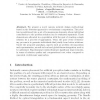Free Online Productivity Tools
i2Speak
i2Symbol
i2OCR
iTex2Img
iWeb2Print
iWeb2Shot
i2Type
iPdf2Split
iPdf2Merge
i2Bopomofo
i2Arabic
i2Style
i2Image
i2PDF
iLatex2Rtf
Sci2ools
EVOW
2005
Springer
2005
Springer
Automated Photogrammetric Network Design Using the Parisian Approach
We present a novel camera network design methodology based on the Parisian approach to evolutionary computation. The problem is partitioned into a set of homogeneous elements, whose individual contribution to the problem solution can be evaluated separately. These elements are allocated in a population with the goal of creating a single solution by a process of aggregation. Thus, the goal of the evolutionary process is to generate individuals that jointly form better solutions. Under the proposed paradigm, aspects such as problem decomposition and representation, as well as local and global fitness integration need to be addressed. Experimental results illustrate significant improvements, in terms of solution quality and computational cost, when compared to canonical evolutionary approaches.
| Added | 27 Jun 2010 |
| Updated | 27 Jun 2010 |
| Type | Conference |
| Year | 2005 |
| Where | EVOW |
| Authors | Enrique Dunn, Gustavo Olague, Evelyne Lutton |
Comments (0)

